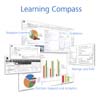The Next-generation "Learning Suite 2013"
 Saarbruecken (GER), May 2013 - IMC has launched the new release of its Learning Suite. With the Learning Compass the leading European learning-management system offers a novel and adaptive learning environment that adjusts the operating elements to the requirements of the users, enables modern social learning, and supports administrators with tailor-made reporting for decision making.
Saarbruecken (GER), May 2013 - IMC has launched the new release of its Learning Suite. With the Learning Compass the leading European learning-management system offers a novel and adaptive learning environment that adjusts the operating elements to the requirements of the users, enables modern social learning, and supports administrators with tailor-made reporting for decision making.
Requirements for corporate learning solutions are complex, but complexity does not have to be complicated. With simplicity as the design principle, IMC has developed an intuitively operable and highly customisable learning environment, the Learning Compass, which is based on a new design and software architecture that makes accessing its comprehensive features easy. Users are guided through the relevant learning processes that facilitate an informal exchange of experience and assist in decision making.
The Learning Suite 2013 (previously CLIX) sets the scene for the learning experience and provides motivation and support for users. New learning arrangements such as massive open online courses (MOOCs) multiply the population of eLearning users and thus increasingly reach those interested in learning outside the world of business. MOOC courses are free of charge and openly available on the Internet without access restrictions.
"These open-learning experiences of the first German-language MOOC infrastructure, the IMC Open Course World, and the Open Innovation process, in which product improvements are implemented together with customers, have contributed to significant innovations for the Learning Suite 2013", declares Dr Wolfgang Kraemer, CEO of IMC AG. The eLearning expert Craig Weiss describes the Learning Suite 2013 by stating, "I really like the product. The user interface is easy and crispy to use".
Adaptive Learning
The expectations of a learning environment, the supporting processes, and user options strongly depend on the target group. Whilst learners frequently require easy access to particular learning content, "heavy users" such as course administrators and tutors expect expansive functionalities and information. Mapping these needs into one convenient user interface is difficult to accomplish. The Learning Suite deliberately does not compromise on user friendliness and meets the demands of both fundamentally different user groups. Information, feature depth, operability, navigation, usability, and interactivity are supported by offering the option to choose between alternative views of the learning environments, which in turn can be customised with continuous variables.
The simple learning environment is considerably slimmer when it comes to its operating elements and stands out for its one-click navigation, simple symbolic language, and reduced menu options. Meanwhile, the advanced learning environment, aided by an expanded search and efficient tab navigation, allows quick toggling between processes, and thereby makes the efficient handling of complex tasks easier.
Guidance
Learners are informed at every stage about where they stand, what they have already achieved, how they perform compared to others, and what the next steps are on the way to a successful learning achievement. Progress bars increase the learning motivation and provide a quick overview. A personal calendar shows scheduled dates and enables direct access to related contents. Automatic notifications and overviews, for example for current learning activities, call the user's attention to particular challenges or approaching due dates.
Ratings and Polls
In order to make the sharing of experiences possible for users, they can contribute actively to the common structuring of the learning processes by evaluating the educational offer and learning contents or recommending trainers, for example in ratings and polls. Educators profit from the users' experiences and can take this feedback into account for their decisions regarding the design of the continued learning program. Additionally, Wikis, forums, and blogs enable the informal exchange of knowledge. All social learning elements can be attributed to any educational measures.
Decision Support and Analytics
Context-sensitive on-the-fly overviews and any aggregation of large data volumes in graphically sophisticated reports provide optimal decision support both for learners as well as educators. For example, reports on skills development, the employees' progress in the course, test results, and deadlines can be generated. Detailed search options return the results both in graphic as well as tabular format, and the results can be grouped. A vast number of export formats such as XLS, CSV, and PNG simplify the further use of the analysis results, e.g. in Excel.
The innovation packs for this product release - still to follow in 2013 and 2014 - will focus on the support of open education processes, peer-to-peer learning and experience sharing, MOOC services, and big-data requirements.








